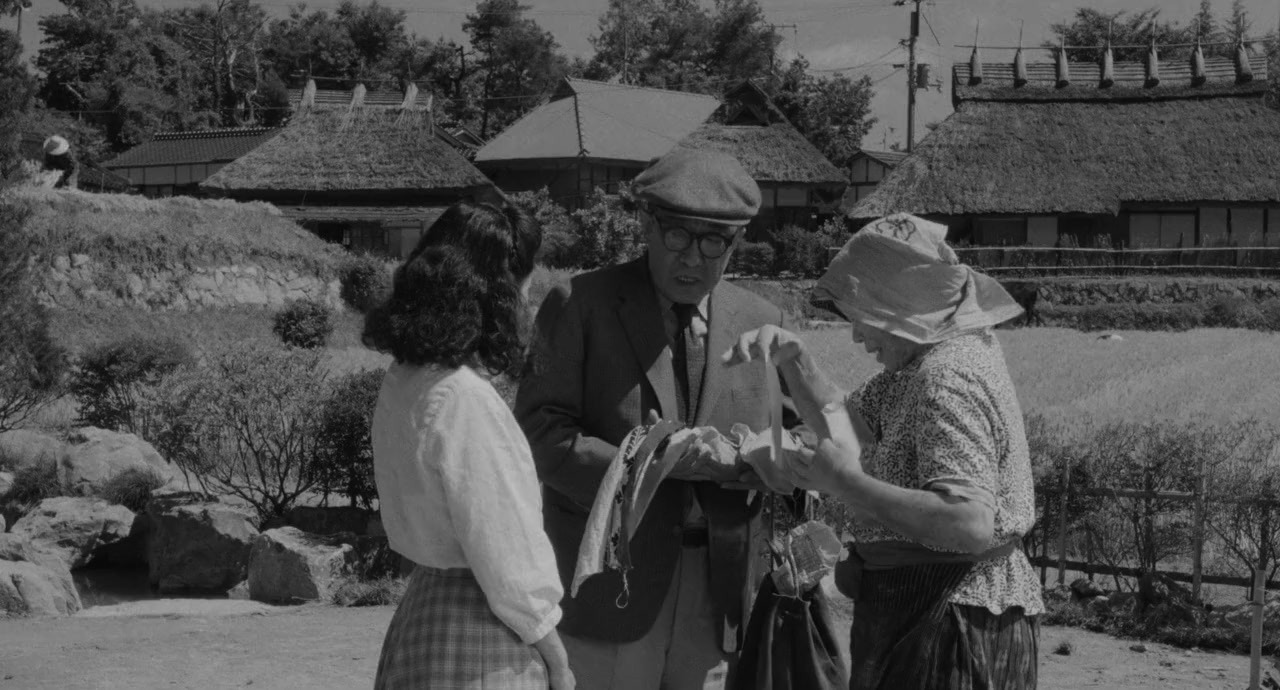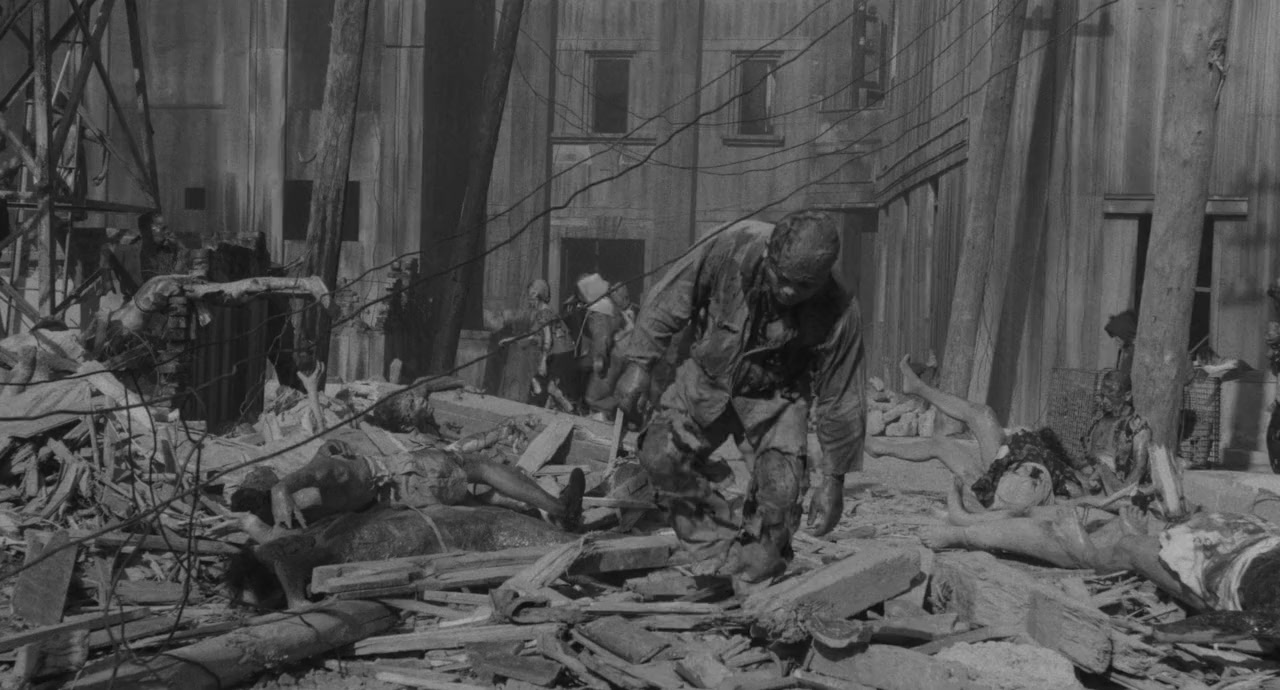
- Year: 1989
- Released: 01 Feb 1990
- Country: Japan
- Adwords: 26 wins & 5 nominations
- IMDb: https://www.imdb.com/title/tt0097694/
- Rotten Tomatoes: https://www.rottentomatoes.com/m/black_rain_2
- Metacritics:
- Available in: 720p, 1080p,
- Language: Japanese
- MPA Rating: Not Rated
- Genre: Drama, War
- Runtime: 123 min
- Writer: Masuji Ibuse, Shôhei Imamura, Toshirô Ishidô
- Director: Shôhei Imamura
- Cast: Yoshiko Tanaka, Kazuo Kitamura, Etsuko Ichihara
- Keywords: marriage proposal, husband wife relationship, based on novel or book, atomic bomb, world war ii, hiroshima, japan,
 | 7.9/10 |
Black Rain Storyline
Mr and Mrs Shizuma, and their niece Yasuko, make their way through the ruins of Hiroshima, just after the atomic bomb has dropped. Five years later, Yasuko is living with her aunt and uncle, and her senile grandmother, in a village containing many of the bomb survivors. Yasuko does not appear to be affected by the bomb, but the Shizuma’s are worried about her marriage prospects, as she could succumb to radiation sickness at any time.—Will Gilbert
Black Rain Photos



Black Rain Torrents Download
| 720p | bluray | 1.1 GB | magnet:?xt=urn:btih:849B7E1D4BC46E15E177090A77EA5409854BF198 | |
| 1080p | bluray | 2.04 GB | magnet:?xt=urn:btih:90153B6AD3D372CB3573F566FF2704BA7CF04481 |
Black Rain Subtitles Download
Black Rain Movie Reviews
Not one of my favorite Imamura films, but powerful, most certainly
Shohei Imamura’s account of the bombing of Hiroshima and its aftermath. Kazuo Kitamura and Etsuko Ichihara play a middle aged couple who, along with their niece, Yoshiko Tanaka, live on the outskirts of Hiroshima when the atomic bomb is dropped. They live with minor injuries while they explore the horrific aftermath (shown in three different segments, the latter two being flashbacks). The Hiroshima segments in the film are absolutely devastating, just horrifyingly graphic. The bulk of the film takes place five years later. The uncle is trying to negotiate his niece’s marriage, but she is tainted in public opinion because of her presence at Hiroshima (people assume she’s not healthy, as many other people who were there are not). The film is quietly devastating. I wouldn’t consider it one of Imamura’s masterpieces, but it’s a fine film. Tanaka, in particular, is brilliant, and I loved the score. The black and white cinematography is quite pretty, too.
Shows deep compassion for humanity
Shohei Imamaura’s Black Rain was released in 1989 just at the onset of the AIDS epidemic, a fact that gives the film about the slow deterioration of Hiroshima radiation victims an added poignancy. The black rain in the title refers to the combination of ash, radioactive fallout, and water that fell one or two hours after the explosion. There have been other books and films about the dropping of the atomic bomb but none as unique and powerful as this one. Based on a novel by Masuji Ibuse who gathered information from interviews and the diaries of real-life bomb victims, the film depicts how an entire family is affected psychologically as well as physically by the bomb years after the original explosion. It is a horrifying vision but one that resonates with deep compassion for humanity.
The film begins in Hiroshima on August 6, 1945 as soldiers and civilians go about their normal daily activities. Suddenly a blinding light flashes and a thunderous blast is heard. Almost every single building is destroyed or damaged beyond repair. The first atomic bomb ever dropped on a city is now a part of history. Survivors must somehow restart their lives, unaware of the bomb’s devastating after effects. Filmed in high-contrast black and white, the story centers around Yasuko (Yoshiko Tanaka), a young woman who is caught in the radioactive rain as her boat heads back to the city to search for friends and relatives. In Hiroshima, Imamura shows us indelible images that remain with us: a young boy with skin hanging from his body pleads with his brother to recognize him, an older man is in tears over his inability to free his son from piles of debris, a mother is in torment as she rocks the blackened body of her child.
When the family returns to their rural home, Yasuko’s life is forever changed. She sees her friends dying around her and waits for the inevitable bouts of radiation sickness that have already affected her Uncle Shigematsu Shimuza (Kazuo Kitamura) and Aunt Shigeko Shimuza (Etsuko Ichihara). Pretending that there is only business as usual, the family denies that the bomb has affected Yasuko. “She forgot how Hiroshima and Nagasaki were destroyed. Everyone forgot it. They forget the hell of fire and go to rallies like an annual festival. I’m sick of it,” says a friend Katayama (Akiji Kobayashi). Yasuko internalizes the tragedy, feeling shame for being different than others and guilty for being contaminated.
When her aunt and uncle try to find her a husband, the eligible men refuse to marry her because of suspicions about her health, even though Shigematsu has copied her diary to prove that she wasn’t directly exposed to the bomb. The only suitor she feels comfortable with is another damaged man, Yuichi (Keisuke Ishida), who has a panic attack every time he hears the roar of an engine. At the end, the beauty of life shows itself ever so fleetingly when Yasuko goes to the pond and sees a sight she has been longing for all her life, the king carp jumping in the water, playfully as if to say that beyond despair there is still joy. Sadly we hear on the radio statements by politicians about using the bomb once again in the Korean War. “Human beings learn nothing”, says Shigematsu. “They strangle themselves. Unjust peace is better than a war of justice. Why can’t they see?” Immamura’s Black Rain has hopefully allowed all of us to see more clearly.
terror and pity
The opening of Imamura’s masterpiece avoids mere sensationalism in its depiction of the unfathomably horrifying events of August 6th, 1945, in which 90% of Hiroshima and tens of thousands of lives were annihilated in an instant. Instead, Imamura emphasizes the unprecedented strangeness of the catastrophe, focusing on such portentous images as the diabolic mushroom cloud louring silently in the distance and the black rain that spatters a beautiful young woman’s face. The rest of the film traces the ramifications of the latter incident, bringing the atomic holocaust and its aftermath (over 100,000 people died of radiation poisoning) down to the intelligible level of the plight of Yasuko (Yoshiko Tanaka) and her small “community bound by the bomb.”
The survivors strive for normalcy and continuity, most notably by attempting to find a suitable marriage for Yasuko, but the imminent possibility of radiation sickness shadows every aspect of their lives. Yasuko’s potential suitors, naturally enough, shy away from a young woman, no matter how attractive, who might suddenly grow sick and die. Genuine love, when it finally does appear, does so unexpectedly and ambiguously. We are left wondering if love across class lines is more a token of Yasuko’s status as “damaged goods” or of a common humanity, thrown into bold relief by harsh circumstances, that transcends class divisions.
The film’s classically restrained style intensifies the impact, the spare, eloquent interior shots reminding us that Imamura began his career as an assistant to the great Ozu. Imamura’s mastery is evident, for example, in the paired scenes of Yasuko bathing, the first emphasizing her lovely back and legs, the second how her hair is falling out. The shots stand almost as bookends to the narrative’s trajectory, distilling its tragic essence. The film’s documentary-style realism is violated for expressive purposes several times, perhaps most notably in a scene that lays bare the troubled interior life of a shell-shocked veteran. Both the score by the renowned avant-garde composer Toru Takemitsu and the stunning black and white photography contribute greatly to the film’s brooding atmosphere. When, in the final shot, Yasuko’s uncle (Kazuo Kitamura), the film’s laconic narrator, looks to the vacant sky for a rainbow as a sign of hope and regeneration, the black and white imagery suddenly becomes so poignant that it is almost unbearable. Few films from Japan (or anywhere else, for that matter) could be compared to the great, humanist Japanese masterpieces of the 1950s. This film is one of them. When I finished viewing it for the first time, I sat stunned, unable to move for at least five minutes, overwhelmed as I was by the emotions great tragedy should inspire: terror and pity.



